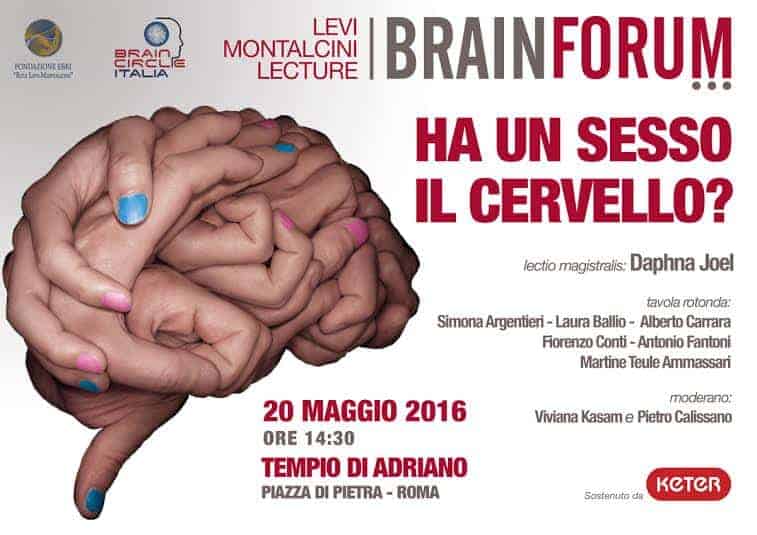
Do the brains of men and women really work differently? Or is it to be considered “unisex”?
For some time, scientists, academics, sociologists, psychologists and feminists have been wondering about the topic. The Brainforum edition DOES THE BRAIN HAVE A SEX? tries to clarify after decades of stereotypes, clichés, social, ethical and cultural disputes opposed to scientific “certainties” – or presumed such.
The conference on May 20th at the Temple of Hadrian in Rome, aimed not only at researchers and scholars, but also at the non-specialist public, presented a very controversial and highly topical topic, at a time when the debate on qualities and identity gender also affects the political and legislative world. Organized by BrainCircle Italia together with the European Brain Research Institute (EBRI), the Rita Levi Montalcini Foundation to promote brain research, the Brainforum aims to be a tribute to the great scientist, Nobel Prize winner. As Prof. Pietro Calissano, her closest collaborator for decades and who today chairs the EBRI, explains: “Rita has always had this issue very close to her heart, she believed that women were absolutely equal to men in terms of thinking ability, including scientific thinking. , and has demonstrated this in his numerous meetings with the public, but also with the growing number of young researchers called to the EBRI and with the creation of a Foundation that distributes scholarships to young African women to continue their studies in their countries of origin”.
Participating in the debate were neurobiologists, geneticists, psychoanalysts, neuroscientists, experts in bioethics, sociologists, who will propose, each from their own point of observation, reflections and also criticisms of the thesis of the Israeli neuroscientist.
The round table was opened by the lectio magistralis of Professor Daphna Joel, researcher at the Sagol School of Neuroscience of Tel-Aviv University, who presented an innovative thesis, developed also thanks to new brain imaging technologies. According to Daphna Joel, gender difference does not exist, just as there is no male brain and female brain, but only behaviors arbitrarily defined as male or female, which are instead absolutely interchangeable and overlapping, sexually connoted only by social and cultural customs.
The scientist’s conclusions have sparked debate in the scientific world and in civil society. Professor Joel, in fact, challenges common thinking on the functional diversity of the brains of men and women, and also the most widespread theses on gender identity, the flag of the feminist movement and of claims based on gender.
In the lecture, Daphna Joel argues that the brains of men and women are identical on a structural level, while on a functional level there is no specificity of brain responses that can be labeled as male and female, but rather a composite mosaic of behaviors sexually connoted by culture and customs .
Daphna Joel was discussed by a prestigious panel of scholars who opened the debate to aspects related to physiology, genetics and epigenetics, psychology, analyzing the numerous factors that contribute to determining behaviors, and also the ethical impact- cultural and social in the broader sense of these new theories: Simona Argentieri, medical psychoanalyst, Fiorenzo Conti and Martine Ammassari Teule, neurobiologists, Antonio Fantoni, geneticist, Alberto Carrara, neuroethicist expert in neuroscience, Silvana Greco, sociologist and the journalist Laura Ballio, journalist of the Corriere della Sera.








